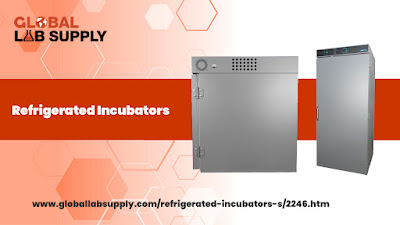In the realm of scientific research and experimentation, precision and reliability are paramount. Scientists and researchers rely on state-of-the-art equipment to ensure the integrity of their work, and refrigerated incubators stand at the forefront of this technological advancement. These ingenious devices, provided by Global Lab Supply, have revolutionized the way experiments are conducted, particularly in the fields of microbiology, cell biology, and biotechnology. Let's delve into the depths of refrigerated incubators, understanding their functionalities, advantages, and how they contribute significantly to the world of science.
Understanding Refrigerated Incubators:
Refrigerated incubators are specialized laboratory instruments designed to maintain a controlled environment for the cultivation and preservation of biological samples. These incubators combine precise temperature control with refrigeration capabilities, ensuring that the internal temperature remains stable, even in fluctuating external conditions. This stability is crucial for experiments involving sensitive biological materials, such as cell cultures, vaccines, and enzymes.
Key Features and Benefits:
Temperature Precision:
Refrigerated incubators from Global Lab Supply boast exceptional temperature precision. They can maintain a consistent temperature range, often adjustable between -10°C to 70°C, allowing researchers to create specific conditions for their experiments. This precision is indispensable for experiments requiring strict temperature controls, ensuring accurate and reproducible results.
Humidity Control:
In addition to temperature control, these incubators often come equipped with humidity control features. Maintaining optimal humidity levels is vital for the growth of certain organisms and cell cultures. Refrigerated incubators with humidity control capabilities provide a stable environment for the samples, preventing desiccation and ensuring their viability over extended periods.
Energy Efficiency:
Global Lab Supply's refrigerated incubators are engineered for energy efficiency. Advanced insulation materials and innovative cooling systems reduce energy consumption, making them environmentally friendly and cost-effective solutions for research facilities. Energy-efficient incubators not only contribute to sustainability but also help research institutions save on operational costs.
Uniform Air Distribution:
User-Friendly Interface:
Global Lab Supply's refrigerated incubators are equipped with user-friendly interfaces and digital displays. Researchers can easily set and monitor the internal conditions, ensuring hassle-free operation. Intuitive controls enhance the user experience, allowing scientists to focus on their research without the distraction of complex equipment management.
Applications in Research and Industry:
Refrigerated incubators find applications in a myriad of scientific fields:
Microbiology:
In microbiology, these incubators provide an ideal environment for the cultivation of bacteria, fungi, and other microorganisms. Researchers can precisely control temperature and humidity, facilitating the study of microbial growth patterns, antibiotic susceptibility, and drug resistance mechanisms.
Cell Biology:
Cell culture experiments demand a controlled environment to ensure cell viability and growth. Refrigerated incubators create the perfect conditions for cell cultures, enabling researchers to study cell behavior, conduct drug testing, and develop therapies for various diseases.
Biotechnology:
In biotechnology research, refrigerated incubators are indispensable for processes like fermentation, enzyme production, and protein expression. These controlled environments are essential for optimizing biotechnological processes, ensuring maximum yield and product quality.
Conclusion:
Global Lab Supply's refrigerated incubators stand as pillars of reliability and precision in the realm of scientific research. Their advanced features, coupled with user-friendly interfaces, make them indispensable tools for laboratories and research facilities worldwide. As technology continues to advance, these incubators evolve, pushing the boundaries of what is possible in scientific exploration.
Are you ready to elevate your research to new heights of precision and reliability? Explore the world of refrigerated incubators with Global Lab Supply. Our cutting-edge solutions empower scientists and researchers, enabling groundbreaking discoveries and advancements. Click here to discover our range of refrigerated incubators and revolutionize your research today. Experience the difference precision makes.




